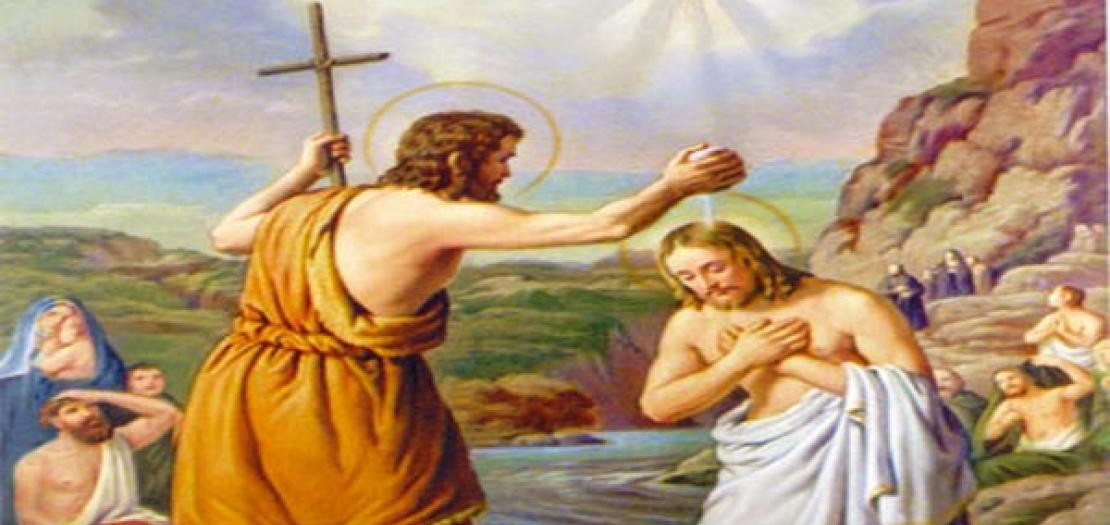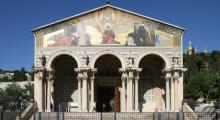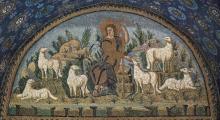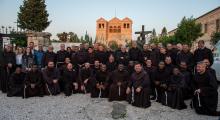Issued by the Catholic Center for Studies and Media - Jordan. Editor-in-chief Fr. Rif'at Bader - موقع أبونا abouna.org

Following is the text of the meditation by Latin Patriarch of Jerusalem His Beatitude Pierbattista Pizzaballa for the Baptism of Lord Jesus Christ, Year C:
The Gospel of Luke does not insist much on the Baptism of Jesus (only an aside), but emphasizes the investiture of Jesus with the descent of the Holy Spirit and the declaration of Jesus as Son of God, who will then be confirmed by the following passage, with the genealogy that presents Him as son of David and of Abraham, but which reaches as far as Adam and then God Creator. Jesus, in Luke’s Gospel, is from the outset in solidarity with all humanity.
The first part of today’s Gospel (Luke 3:15-26, 21-22), once again, presents John the Baptist, who is preparing the people for the coming of the Messiah, who is another and not he, as the people tended to believe (v.15). But the Jesus Himself needs to prepare for the mission entrusted to Him by the Father, and Luke, in today’s text, presents the divine vocation of Jesus, His investiture through the Holy Spirit, His status as Son of God, His solidarity with God’s plan. Despite this solemn investiture by God Himself, the Son of God needs, in any case, to discern the Father’s Will and submit to it, to remain in right relationship with Him.
Besides, in the Old Testament, we have an example of how to stand before God. In the book of Genesis, which Paul will take up again in the Letter to the Romans (Rm 4:3), it states that when God again promises a descendant to Abraham, Abraham “believed the Lord, who credited it to him as righteousness|” (Gen 15:6). It means that God deems the faith of Abraham as the right way of being in a relationship with Him; God declared good this way of being before Him, the way of faith, of those who entrust themselves to Him in the impossibility of their strength.
Abraham does not trust himself; does not trust in his own abilities, his own observance, his own loyalty; he trusts God, and this pleases the Lord, He is delighted by this.
Which is why Abraham becomes a model of believing for all generations, he becomes the father of faith, precisely for having found that way of standing before God that pleases God.
Jesus, also, at the beginning of His public life, chose in which way to live His belonging to the Father, that of being a man in the midst of ordinary men and who, even though not being a sinner, He stood in line with sinners to receive the baptism of repentance of the Baptist. He chose to remain faithful to the Incarnation, to stay within this style: of being wholly God in this being merely a man. The baptism is Jesus’ choice of being a powerful man, robust, rich but, like every other simple man, in need of salvation and life, a man who awaits life from God, and who therefore needs to pray (Lk 3:21), to keep himself always in an intimate relationship with Him.
This choice, as recounted in the Gospel of Luke, has two aspects.
The first, we have already mentioned, is that the fulness of the Spirit descends on Jesus (Luke 3:22), the fullness of divine life. The sky opens (Lk 3:21), and every separation is in some way overcome, even that between God and man. Divine life is not reserved to God, and it is not even set aside for any special characters. It is given to all and, in Jesus, it comes down on humanity which simply lives its vocation to be son; it is given to man who feels himself brother of other men. Humanity, then, can be despised no more, or considered far from God: it is the place where divinity spills over, expresses itself, fulfills itself.
The second is that the Father sees this choice of Jesus, and is pleased (Luke 3:22).
Just as He deemed the attitude of Abraham just, He also holds Jesus’ attitude just: in it He recognizes Himself, recognizes that Jesus “interprets” precisely His plan, His style.
Because God does not want to be a powerful God, extraordinary; He wants to be a God who loves, who gives life. He does not want to be a distant God that is disinterested in man. On the contrary, He is interested in the point of making the question of man His own question, His own life. Not from the outside, not by thought, but in His own flesh. For us, then, we just have to be amazed at this pleasure of God. He is pleased when we are in solidarity, brothers in common humanity; when we recognize in this humanity, wounded and redeemed, the greatest gift He has given us.
+Pierbattista Pizzaballa
Latin Patriarch of Jerusalem







